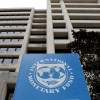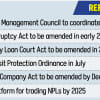IMF urges Bangladesh to prioritise sustainable revenue generation

Bangladesh should prioritise sustainable revenue generation to bolster investments in social welfare and development initiatives and include tax policy and administrative measures in the budget for the upcoming financial year to augment tax collections, said the International Monetary Fund (IMF) today.
"At the same time, a medium- and long-term revenue strategy, with an accompanying implementation framework, should guide future reforms. Reducing subsidies, improving expenditure efficiency, and managing fiscal risks will allow for additional spending on social safety nets and growth-enhancing investment."
The observation comes as an IMF mission team led by Chris Papageorgiou concluded its 15-day visit to Bangladesh today. During the visit, it discussed economic and financial policies in the context of the second review of the programme.
In a statement, the IMF said the macroeconomic outlook is expected to gradually stabilise as policy actions start to take hold.
Real GDP growth is projected to moderate to 5.4 percent in FY2023-24 owing to the ongoing import compression and policy tightening. However, it is anticipated to rebound to 6.6 percent in FY2024-25 as imports rebound and foreign currency pressures ease.
Inflation is projected to remain elevated at approximately 9.4 percent (year-on-year) in FY24 but is anticipated to decline to around 7.2 percent in FY25, on the back of the continued tighter policy mix and projected lower global food and commodity prices.
"Nevertheless, uncertainties surrounding the outlook remain high, with risks predominantly leaning towards the downside," said the global lender.
The IMF said reducing banking sector vulnerabilities remains a priority, and efforts to implement the non-performing loan reduction strategy should help support the growing financing needs of the economy.
"At the same time, Bangladesh Bank should continue the transition to risk-based supervision to enhance financial sector resilience, while continuing legal reforms to improve corporate governance and regulatory frameworks. Looking ahead, domestic capital market development will be instrumental in mobilising long-term financing to support growth."
The statement said maintaining the reform momentum is critical to align with the authorities' goal of reaching upper middle-income country status by 2031.
"Diversifying trade, attracting more foreign direct investment, enhancing the investment climate, and strengthening governance will be crucial in this regard."
It said building resilience to climate change will help mitigate macroeconomic and fiscal risks. Ongoing efforts to strengthen institutions and enhance spending efficiency would help meet climate objectives and mobilise climate finance, particularly from private sources.
"At the same time, the government should prioritise climate-responsive fiscal management reforms and undertake green and resilient infrastructure investment. Better management of climate-related risks will enhance financial sector resilience as well."

 For all latest news, follow The Daily Star's Google News channel.
For all latest news, follow The Daily Star's Google News channel. 







Comments